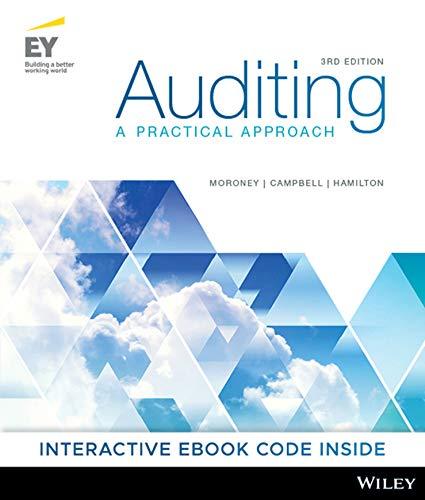Question
Question 1. IPSAS 36 stipulates that an entity need not apply the equity method to its investment in an associate or a joint venture if
Question 1. IPSAS 36 stipulates that an entity need not apply the equity method to its investment in an associate or a joint venture if the entity is a controlling entity that is exempt from preparing consolidated financial statements. Which of the following would allow for an exemption from applying the equity method?
The entity itself is a controlled entity and the information needs of users are met by its controlling entitys consolidated financial statements, and, in the case of a partially owned entity, all its other owners, including those not otherwise entitled to vote, have been informed about, and do not object to, the entity not applying the equity method.
The entity did not file, nor is it in the process of filing, its financial statements with a securities commission or other regulatory organization, for the purpose of issuing any class of instruments in a public market.
The entitys debt or equity instruments are not traded in a public market.
All of the above apply
Question 2. Under IPSAS 39 'Employee benefits', which one of the following terms best describes benefits which are payable as a result of a public sector entity's decision to end an employee's employment before the normal retirement date?
Defined benefit plans
Termination benefits
Defined contribution plans
Post-employment benefits
Question 3. Which of the following are classed as financial instruments according to International Public Sector Accounting Standards (IPSAS)? 1) Trade receivables 2) Loans 3) Cash 4) Forward contracts
1, 2, 3 and 4
4 only
1, 2 and 3 only
2 and 4 only
Question 4. On the date of adoption of accrual-based IPSASs, an entity is required to apply the IPSASs retrospectively except if required, or otherwise permitted, not to do so under IPSAS 33. IPSAS 33 distinguishes between two kinds of transitional exemptions: (1) Transitional exemptions that do not affect fair presentation and compliance with accrual-based IPSASs during the period of adoption (2) Transitional exemptions that affect fair presentation and compliance with accrual-based IPSASs during the period of transition. Which of the below statements is true in regards to application of IPSAS 33:
An entity applying category (1) transitional exemptions cannot make an explicit and unreserved statement of compliance with IPSAS
An entity applying category (2) transitional exemptions can make an explicit and unreserved statement of compliance with IPSAS
An entity applying category (2) transitional exemptions cannot make an explicit and unreserved statement of compliance with IPSAS
None of the above
Question 5. Which one of the following assets do not meet the definition of investment property included within IPSAS 16 'Investment property'?
Land currently held for an undetermined time period
A building owned by a government unit and leased out under an operating lease
A building that is vacant but is held to be leased out
Property being constructed on behalf of third parties
Question 6. Identify which of the following statements is false:
Under IPSAS 26 Impairment of Cash-Generating Assets, an entity must perform an impairment review for all its assets every 3 years
Goodwill should be reviewed for impairment at each year end
Under IPSAS 17 Property, plant and equipment residual life and useful economic life must be reviewed annually
Brands that are purchased may be capitalised under IPSAS 31 Intangible assets
Question 7. IPSAS 27 'Agriculture' describes the accounting treatment relating to agricultural activity. When first recognized and at each year end reporting date a biological asset should be measured at:
Cost
Cost after applying an impairment cost
Market value
Fair value less estimated point of sale costs
Question 8. According to IPSAS 23 'Non-exchange revenue' which of the below is not non-exchange revenue?
Taxes
Transfers
Sale of goods
Debt forgiveness
Question 9. An entity shall present information separately for interests in all of the below, except:
Associates
Pool of long-term assets
Controlled entities
Structured entities that are not consolidated
parated broadly into those related to operating, investment and financing purposes
Step by Step Solution
There are 3 Steps involved in it
Step: 1

Get Instant Access to Expert-Tailored Solutions
See step-by-step solutions with expert insights and AI powered tools for academic success
Step: 2

Step: 3

Ace Your Homework with AI
Get the answers you need in no time with our AI-driven, step-by-step assistance
Get Started


